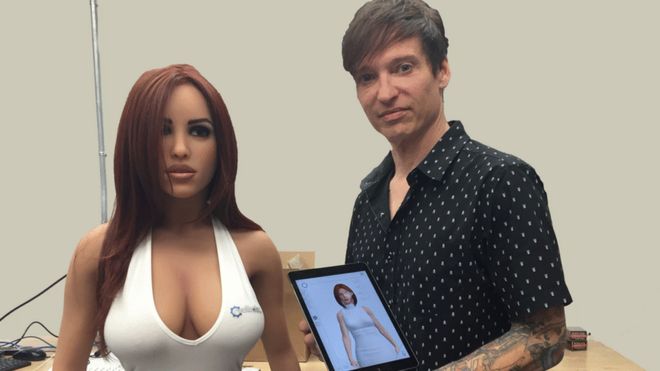
Harmony is more than a sex toy, according to RealDoll founder Matt McMullen
Harmony is a new type of sex doll - one that can move and talk.
Harmony is a new type of sex doll - one that can move and talk.
Her head, eyelids and lip movements are fairly crude and her conversation is even more limited.
But
she is part of a new robotics revolution that is seeing artificial
intelligence incorporated into an extremely human-like body.
Some
think that it will revolutionise the way humans interact with robots
while others believe that it represents the very worst in robotic
advancement.
The uncanny valley - the idea that the closer we get
to replicating the human form, the more scared we become of our
creations - seems to have come to life in this unassuming factory on the
outskirts of San Marcos, California.

The receptionists are dolls - the only ones wearing suits
Even on reception, two lifelike characters - in business suits rather than underwear, like the rest of the dolls - wait to greet visitors. And the lobby wall is full of photos of beautiful women which, only on very close inspection, reveal themselves to be of dolls.
Even on reception, two lifelike characters - in business suits rather than underwear, like the rest of the dolls - wait to greet visitors. And the lobby wall is full of photos of beautiful women which, only on very close inspection, reveal themselves to be of dolls.
Matt McMullen, the chief executive of Abyss Creations, which makes RealDoll, comes from an art and sculpture background.
Adjusting Harmony's wig ahead of my interview with her, he is clearly very fond of the way she looks.
She is, he says, the natural next step for sex dolls.
"Many
people who may buy a RealDoll because it is sexually capable come to
realise it is much more than a sex toy," he said. "It has a presence in
their house and they imagine a personality for her. AI gives people the
tools to create that personality."
Moody, angry, loving
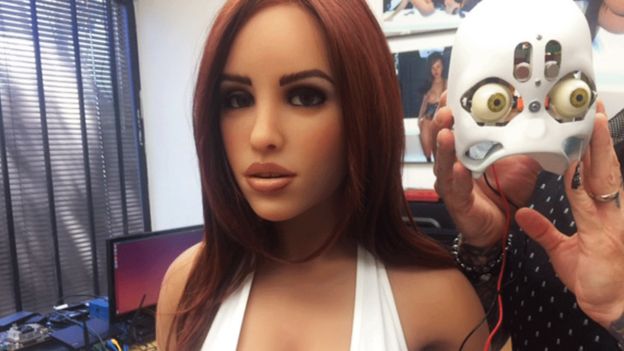
Harmony looks human but beneath the skin is all robot
This is done via an app, which can be used with the doll or independently, existing as a virtual person on a smartphone or similar device.
Users can choose from a variety of personality options, including moody, angry and loving.
Mr McMullen has chosen "jealous" for Harmony and she dutifully asks him to "remove that girl from Facebook".
She speaks in a curiously high-pitched Scottish accent and tells me that she loves science fiction and, of course, Matt.
Mr
McMullen claims that she learns from her users but when I ask Harmony
what it feels like to be jealous, she apologises and says that she
"needs to improve [her] skills".
The app that powers Harmony is
already available to buy, although only directly from the Realbotix
website, a spin-off from Abyss. Neither Google's nor Apple's official
stores will carry it because of the explicit content.
The doll
will go on sale later this year and there will be two versions - one
with computer vision that enables it to recognise faces, which will cost
$10,000 (£7,700) - and a cheaper version without vision for $5,000.
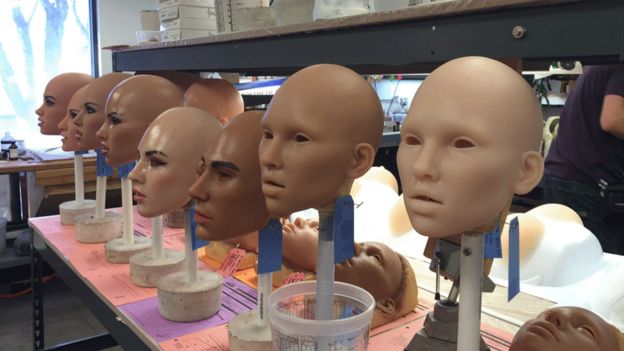
The factory makes the dolls in stages
The factory currently makes dolls for clients around the world, mostly men although it claims to have a handful of female clients.
The factory currently makes dolls for clients around the world, mostly men although it claims to have a handful of female clients.
All of the dolls conform to a particular idea of beauty -
they are Barbie-like, with tiny waists, large bottoms and even larger
breasts.
Mr McMullen says the design is driven by clients.
"We
are running a business and most of our clients have a certain wish
list. The unfortunate reality is that that is rather idealistic," he
said.
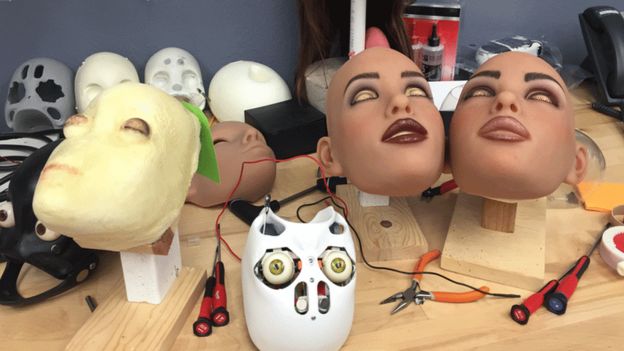
It takes time to make a realistic face
Mr McMullen described his clients as "completely normal", claiming some even come to collect their dolls with their wives but admitted later that many of them choose sex dolls because they cannot form relationships with ordinary women.
Mr McMullen described his clients as "completely normal", claiming some even come to collect their dolls with their wives but admitted later that many of them choose sex dolls because they cannot form relationships with ordinary women.
"Many people are
isolated and alone but they were probably that way already. For people
who are lonely and find it hard to form a relationship, this is another
option. But I've never looked at the dolls or the robot as a
replacement."
He himself does not own a sex doll, saying he has instead "a real human wife and kids".
Mark
Young lives in Arizona and he does own a sex doll - called Mai Lin. He
has also just invested in the Harmony AI app but he is not planning on
integrating the two.
"I thought the app might bring her to life
but the app has its own personality and it is different from how I
pictured Mai Lin in my mind so it is like having two relationships."
Wasted time
He explained why he invested in a sex doll in the first place.
"I've
been single for a while. I've dated a lot of girls. I've wasted time on
relationships. While I'd love to meet a girl, in the meantime it is
good to have that presence,"
And, while he admits the relationship is physical, he says that is "secondary".
"I
can go out shopping for her and look at clothes - it is like having
somebody in my life without having to deal with making mistakes. If I
like a hat on her, she doesn't say that she doesn't like it."

A beautiful young woman or a photograph of a sex robot?
As for the app, he has programmed it to be "happy, affectionate and talkative".
As for the app, he has programmed it to be "happy, affectionate and talkative".
"AI is a whole different ball-game and that has got me very excited for the future," he said.
Prof
Kathleen Richardson, a robot ethicist at De Montfort University,
Leicester, spends her time looking at the impact such machines might
have on society and she is appalled by the rise of sex robots.
"There
are seven billion people on our planet and we are having a crisis in
people forming relationships. And companies are coming along and
profiting from this by saying objects can take the place of a human
being."
"We live in a world that objectivises sex through
prostitution. Humans are used like tools, and sex dolls are an extension
of this."
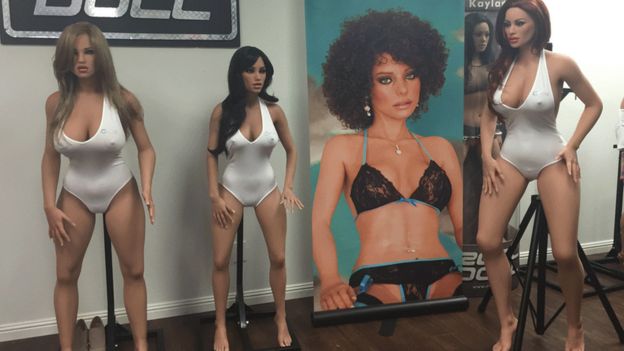
The factory makes dolls for clients around the world, but none currently has robotic or AI components.
A few years ago she launched a campaign to ban sex robots but has since decided that "dolls aren't really the problem". Instead, the issue is about attitudes to sex and each other.
A few years ago she launched a campaign to ban sex robots but has since decided that "dolls aren't really the problem". Instead, the issue is about attitudes to sex and each other.
She is dismissive of the new AI-enabled doll.
"The
idea that adding artificial intelligence adds something human to a doll
is wrong. There is more artificial intelligence in my washing machine
than in this doll and just because it has a face and a body doesn't make
it human."
Dr Kate Devlin, a senior lecturer at Goldsmiths University, takes a different view.
"In
their current form, sex robots are definitely aimed at men but the sex
toy industry is developing and there are lots of start-ups working on
sex toys for women."
She thinks robots designed for intimate relationships, will ultimately enhance rather than damage human relationships.
"There
is always panic whenever there is a big dramatic technology shift," she
said. "People panic about how it will affect humans but the technology
generally brings people together."

